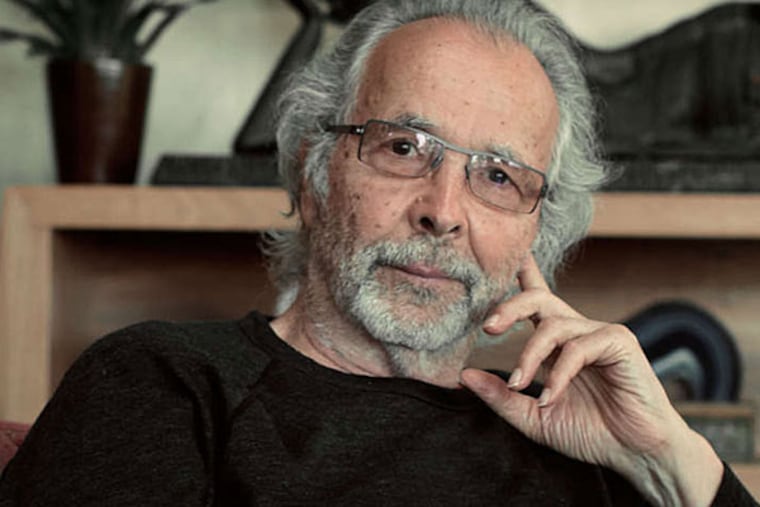Herb Alpert: Still the man with a golden horn
As a kid growing up in the Boyle Heights neighborhood of Los Angeles, Herb Alpert heard a lot of music around the house.

As a kid growing up in the Boyle Heights neighborhood of Los Angeles, Herb Alpert heard a lot of music around the house.
His father, Louis, played mandolin, and his brother was a drummer. He himself started on trumpet at age 8, getting classical training. After high school, he went to the University of Southern California, where he played trumpet in the marching band for two years before dropping out. He went on to the Army - and from there to pop superstardom.
That little boy is now 79, with a slew of chart-topping hits, albums, a leading music company (A&M), and millions of sales to his name, plus abundant Grammys (he won one last year, for best pop instrumental album, Steppin' Out). His new album is titled In the Mood (Shout! Factory ***) and, with wife/musical partner/muse Lani Hall, he'll be bringing his tour to the Sellersville Theater on Oct. 15.
What records were on his parents' turntable?
That relaxed, whispery voice (think: "This Guy's in Love With You") comes over the phone from his home in Los Angeles: "Earlier on, it was Harry James, and a little bit of classical. I remember Bolero by Ravel. Later, when I was 16 or 18, it was a jazz period, with Louis Armstrong, Miles [Davis], Chet Baker, Gerry Mulligan."
But "what really got me off was the day I heard 'Sh-Boom,' by the Chords. I still remember where I was, staring at this brown plastic radio. It got me started on that whole thing. I remember being up at Lake Arrowhead and hearing Patsy Cline, 'You Belong to Me' - 'Fly the ocean in a silver plane.' It's true what they say: Music is déjà vu."
Always both a traditionalist and a mash-up artist, even before the word existed, in his 1960s Tijuana Brass days, Alpert specialized in redoing standards and lesser-known tunes in new ways. French pop ("What Now My Love"), Beatles, bossa nova ("The Girl From Ipanema"), movie themes ("Zorba the Greek"), 1940s hits ("Tangerine" and "Flamingo"), he Alpertized them all.
"I never played any of those tunes, hardly at all, before I went in to record them," he says. " 'Zorba' was different, it was technical, and I had to get it under my fingers, but other than that, I always wanted things to be as spontaneous as possible. I still do."
In the Mood lines right up with that. You have standards, such as "When Sunny Gets Blue" (in a spacious, reverent track): "Spaciousness is a good word. It's what I do try to do. I'm very conscious of the lyric, try to play the horn through the lyric. In 'Sunny,' that first line, 'When Sunny gets blue, her eyes get gray and cloudy,/ Then the rain begins to fall,' that's poetry, and I try to put that through the horn."
"America the Beautiful" is the album's stunning closer, in which different sets of ethnic drums serve as metaphors for the mix of ethnicities and cultures in this big country.
These join new stuff, such as Alpert's delightful original "Zoo Train." The leadoff is a bracing rethink of "Chattanooga Choo-Choo," with a galvanic electro arrangement by his nephew, Randy Badazz Alpert. Next is "Blue Moon," in which funk and straight-ahead jazz, with the Alpert trumpet, a little breathier these days, playing as if singing.
How did he know it was time to do a new one? "I don't even think like that," he says. "I had a few ideas for tunes, and some of the musicians sent me some great loops I was playing with. I pick melodies that touch me, and I see if I can do them in a way they haven't been done before."
How does the road at 79 compare to the road in his 20s and 30s? "It's definitely not as easy," he says. "I don't recover as quickly. But I get energy from playing. I feel really good afterward. People come up after a show and say, 'Doesn't it make you tired?' No, it feels good. But the plane flights and sound rehearsals can be a little tedious. The reward is playing, ever since I was 8 and first picked up a trumpet."
His marriage/musical partnership/soul mating with Hall started in 1966, while he was producing Sergio Mendes and Brasil '66, his then-newly signed powerhouse act, in which Hall was one of the lead singers. They will celebrate their 41st anniversary in December. During that span, both have had consistent, satisfying musical careers. Her voice and influence are all over his work, including In the Mood.
"She is my absolute best friend in this world," he says. "She has helped me with so much. She's a world-class artist and memoirist, and she's very honest. When I wake up, I can't wait to talk to her."
Together, through the Herb Alpert Foundation, they champion arts education, which "in too many places isn't being funded anymore, but should be a core subject in all schools." The arts present children something they have to work on, "but if they stay with it, they can find their own uniqueness, and understand other people's uniqueness. We could use a little more harmony in this world."
CONCERT
Herb Alpert & Lani Hall
8 p.m. Oct. 15. Sellersville Theater, 24 W. Temple Ave.
Tickets: $65-$90
Information: 215-257-5808,
www.st94.comEndText